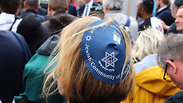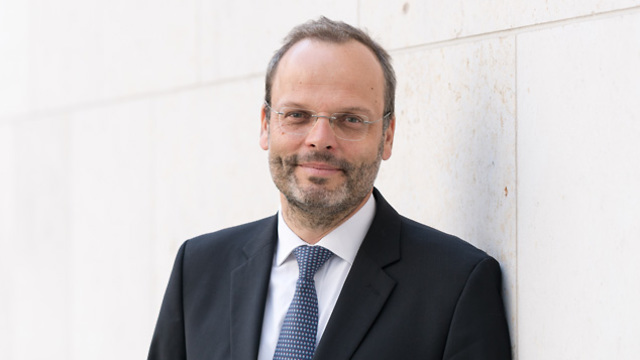
Rivlin 'shocked' as German official warns Jews over wearing kippah in public
President says Jewish people will never submit to hate after Commissioner on Anti-Semitism Felix Klein cites security concerns as reason for his call, suggests training for teachers, police
Speaking in an interview published Saturday by the Funke regional press group, Felix Klein said that he was reversing his previous position about the dangers posed to Jews who were identifiable by their religious headcovering.

Anti-Semitic crimes rose 20 percent in Germany last year, according to Interior Ministry data that blamed nine out of 10 cases on the extreme right.
"I cannot advise Jews to wear the kippa everywhere all the time in Germany," Klein said Saturday. In issuing the warning, he said he had "alas, changed my mind (on the subject) compared to previously."

The interview elicited a defiant response from the president.
“The statement of the German government’s anti-Semitism commissioner, that it would be preferable for Jews not wear a kippa in Germany out of fear for their safety, shocked me deeply," Rivlin said the president said.
"Responsibility for the welfare, the freedom and the right to religious belief of every member of the German Jewish community is in the hands of the German government and its law enforcement agencies," Rivlin said.
"We acknowledge and appreciate moral position of the German government, and its commitment to the Jewish community that lives there, but fears about the security of German Jews are a capitulation to anti-Semitism and an admittance that, again, Jews are not safe on German soil.
"We will never submit, will never lower our gaze and will never react to anti-Semitism with defeatism – and expect and demand our allies act in the same way.”
Klein, whose post was created last year, cited "the lifting of inhibitions and the uncouthness which is on the rise in society" as factors behind a rising incidence of anti-Semitism.
"The internet and social media have largely contributed to this -- but so have constant attacks against our culture of remembrance," he said.
He suggested police, teachers and lawyers should be better trained to recognise what constitutes "clearly defined" unacceptable behaviour and "what is authorised and what is not".
His comments came just weeks after Berlin's top legal expert on anti-Semitism said the issue remains entrenched in German society.
"Anti-Semitism has always been here. But I think that recently, it has again become louder, more aggressive and flagrant," Claudia Vanoni told AFP in an interview, adding the problem was "deeply rooted" in German society.
Vanoni said the proliferation of online platforms that allow people to express extremist views without inhibition while hiding behind screens had fostered the rise in cases.
The arrival in parliament of the far-right AfD, whose leaders openly question Germany's culture of atonement for World War II atrocities, has also contributed to the change in atmosphere, as has the arrival of more than a million asylum seekers, many from Muslim countries such as Syria, Afghanistan or Iraq.
Klein said that while the far-right was to blame for the vast majority of anti-Semitic crime, it was apparent that some Muslims were also influenced by watching certain television channels "which transmit a dreadful image of Israel and Jews".











